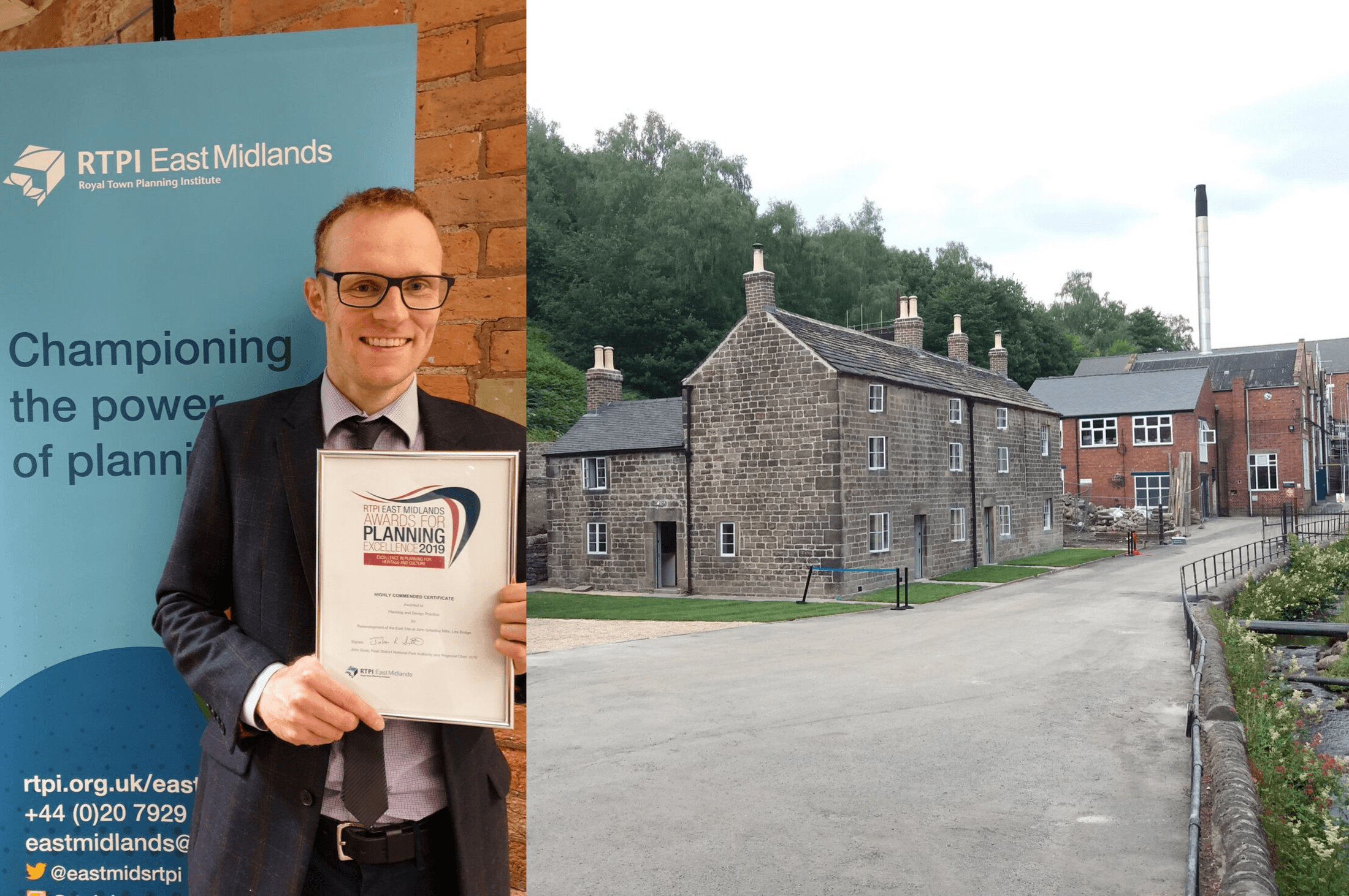The team at Planning Design were both surprised and delighted to be awarded the Highly Commended Certificate for Excellence in Planning for Heritage & Culture at the recent RTPI East Midlands Awards for Planning Excellence 2019.
The awards were held at the Roundhouse in Derby, at a sold out event on Thursday 26 September, which was attended by over 100 planning professionals from across the East Midlands.
The Highly Commended Certificate was for our work on the redevelopment of the ‘East Site’ at John Smedley Mills, Lea Bridge. Planning Design were instructed as planning consultants, alongside Evans Vettori Architects to deliver a complex set of proposals for redevelopment, conversion and part demolition on the site, which is the last working textile mill in the Derwent Valley World Heritage Site and the “oldest manufacturing factory in the world”.
The ‘East Site’ was no longer needed for garment manufacture and development was needed to secure a beneficial future use for the land and buildings and to support the company’s development and expansion. The scheme included the renovation of three late 18th century Grade II Listed cottages which were in a very poor state of repair and on the “heritage at risk” register.
With initial discussions with John Smedley Ltd beginning in December 2015, the development is now well underway, with the listed cottages having been fully restored by the summer of 2019. The redevelopment involved an innovative planning approach as it incorporated both conversion and new build and multiple heritage designations.
Some creative thinking by all parties resulted in a proposal to restore the derelict and run-down eighteenth century ‘Arkwright’ style cottages as part of the scheme. Achieving this objective was not straightforward in planning terms –the cottages lie within a different Council area to the remainder of the factory site and were in such a poor state of repair it wasn’t possible to enter the buildings to carry out a full survey.
With a number of stakeholders involved, Planning Design collaborated with John Smedley Ltd and Evans Vettori Architects as well as working proactively with Amber Valley Borough Council, Derbyshire Dales District Council, Dethick Lea and Holloway Parish Council as well as English Heritage and the Derwent Valley Mills World Heritage Site Partnership. Working together, this enabled the delivery of complex and innovative planning proposals, which straddled two Authorities and involved both conversion and new build and multiple heritage designations.
As the site is in both a Conservation Area and a World Heritage Site, planning identified and was sympathetic to the fact that all new development must preserve or enhance the character and appearance of the wider area.
Creative thinking and diplomatic negotiation was necessary to secure an affordable housing contribution within the plan for the ‘at risk’ listed cottages (thus facilitating their re-use and restoration) plus securing other 106 contributions. This included funds to establish a John Smedley Archive to protect and promote a historically significant garment collection as well as a significant investment in apprenticeships, creating new ancillary tourism, education and employment opportunities.
Jon Millhouse, Director of Planning Design who accepted the certificate said
“We are genuinely thrilled with this recognition by the RTPI. Working within both a conservation area and a UNESCO World Heritage site brought numerous challenges in addition to those already inherent to the listed buildings at the John Smedleys site.
This is a great example of a successful partnership that has helped to ensure a sustainable and viable future for the oldest manufacturing factory in the world, creating opportunities for this unique historical site which will bear fruit long into the 21st century and beyond.”
Planning Design recognise the importance of the built heritage in our towns, villages and rural areas. We have worked on numerous schemes affecting Listed Buildings, Conservation Areas and the Derwent Valley Mills World Heritage Site. Director Jon Millhouse specialises in heritage planning and design team leader Lindsay Cruddas is a registered Specialist Conservation Architect.







